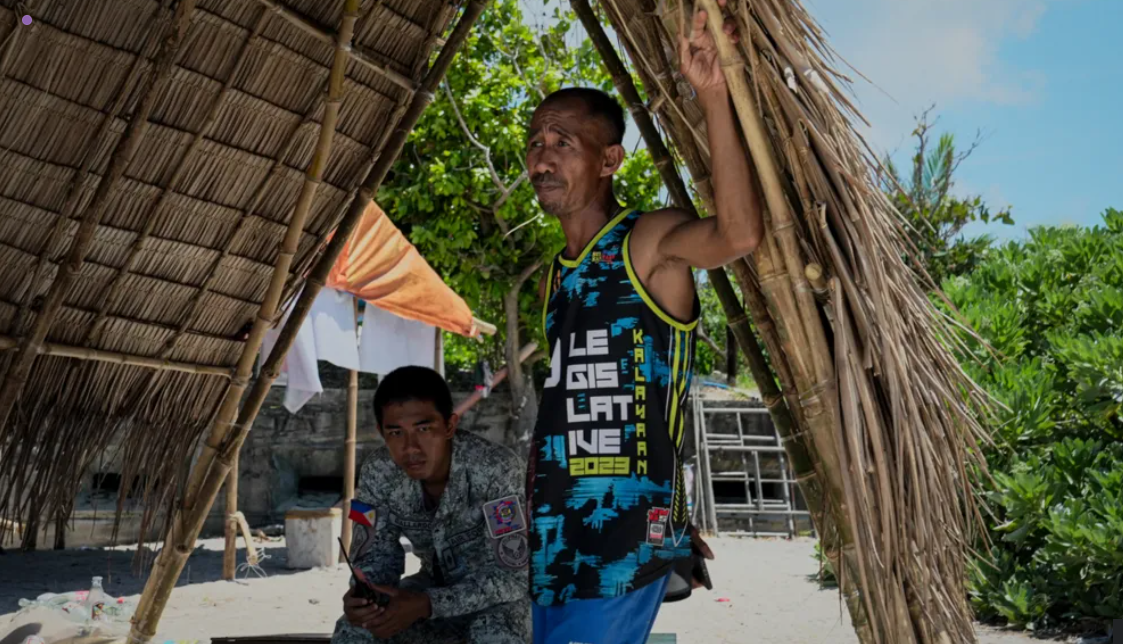(BBC News) At just 37 hectares, the Philippines-controlled island of Pagasa – or “hope” – is smaller than Buckingham Palace. There is almost nothing there.
The 300 or so inhabitants live in a cluster of small, wooden houses. They fish in the clear, turquoise waters, and grow what vegetables they can in the sandy ground.
But they are not alone in these disputed waters: just off shore, to the west, lies an armada of ships.
These are all Chinese, from the navy, the coastguard or the so-called maritime militia – large fishing vessels repurposed to maintain Chinese dominance of this sea. As our plane approached the island, we counted at least 20.
For the past 10 years, China has been expanding its presence in the South China Sea, taking over submerged coral reefs, building three large air bases on them, and deploying hundreds of ships, to reinforce its claim to almost all of the strategic sea lanes running south from the great exporting cities on the Chinese coast.
Few of the Southeast Asian countries that also claim islands in the same sea have dared to push back against China; only Vietnam and the Philippines have done so. The militaries of both countries are much smaller than China’s, but they are holding on to a handful of reefs and islands.
Pagasa – also known as Thitu and other names, as it is claimed by several other countries – is the largest of these.
What makes it exceptional, though, is the civilian population, found nowhere else on the islands of the South China Sea. From the point of view of the Philippines, this and the fact that Pagasa is solid land, not a partially submerged reef or sandy cay, strengthens its legal claims in the area.
“Pagasa is very important to us,” Jonathan Malaya, assistant director-general of the Philippines National Security Council, tells the BBC.
“It has a runway. It can support life – it has a resident Filipino community, and fishermen living there.
“And given the size of the island, one of the few that did not need reclaiming from the sea, under international law, it generates its own territorial sea of 12 nautical miles.
“So it is, in a way, a linchpin for the Philippine presence.”
Reaching Pagasa is a two- to three-day boat ride from the Philippines island of Palawan, or a one-hour plane ride, but both are at the mercy of frequent stormy weather.
Until they surfaced the runway two years ago, and lengthened it to 1,300 metres, only small planes could land. Now they can bring in big C130 transport aircraft. Travelling in them, as we did, is a bit like riding a bus in rush hour.
Everything has to be brought from the mainland, which is why our plane was packed, floor to ceiling, with mattresses, eggs, bags of rice, a couple of motorbikes and piles of luggage – not to mention lots of military personnel, most of whom had to stand for the entire flight.
A lot has changed in recent years. There is a new hangar, big enough to shelter aircraft during storms. They are building a control tower and dredging a small harbour to allow bigger boats to dock. We were driven around the island by some of the Philippines marines who are stationed there, though given its size it hardly seemed necessary
The Philippines seized Pagasa from Taiwan in 1971, when the Taiwanese garrison left it during a typhoon. It was formally annexed by the Philippines in 1978.
Later, the government started encouraging civilians to settle there. But they need support to survive on this remote sliver of land. Families get official donations of food, water and other groceries every month. They now have electricity and mobile phone connectivity, but that only came four years ago.
Aside from government jobs, fishing is the only viable way to make a living, and since the arrival of the Chinese flotillas even that has become difficult.
Jonathan Malaya says his government has made a formal diplomatic protest every week to the Chinese Embassy over the presence of its ships in what the Philippines views as the territorial waters of Pagasa. This is in marked contrast to the previous administration of President Rodrigo Duterte, which avoided confrontations with China in the hope of getting more investment in the Philippines.
“I think we will get more respect from China if we hold our ground, and show them we can play this game as well. But the problem of democracies like the Philippines is policies can change with new administrations. China does not have that problem.”
https://www.bbc.com/news/articles/cdxkkvw8r4no


